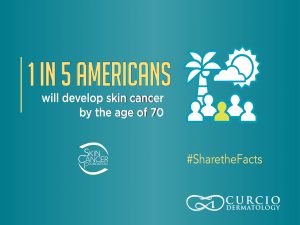Skin Cancer
- Acne
- Acne Scars
- Benign Growths
- Red Birthmarks
- Excessive Sweating (Hyperhidrosis)
- Melasma
- Melanoma
- Moles (Nevi)
- Pre-cancers (Actinic Keratoses)
- Rosacea
- Acne Scarring
- Skin Cancer
- Brown Spots & Freckles
- Total Body Photography
- Veins
- Wart Removal
- Wrinkles
- Cherry Angiomas
- Enlarged Pores
- Redness of Neck or Chest

Skin cancer is the most common form of cancer in the United States.
More than 3.5 million skin cancers are diagnosed annually and 1 in 5 Americans will develop some form of skin cancer in their lifetime. Skin cancer is
highly curable when identified in its earliest stages. Screening by a dermatologist can identify these lesions when they are most curable and can be performed during an office visit. Protecting the skin from sun damage with daily sunscreen, self-screening and regular skin exams by a dermatologist are a few things that can minimize the risk.
Basal cell carcinoma (BCC) is the most common form of skin cancer. More than 2.8 million cases of this skin cancer are diagnosed in the United States each year. BCCs often appear as a pearly red or pink bump.
Squamous cell carcinoma (SCC) is the second most common form of skin cancer. An estimated 700,000 cases of SCC are diagnosed each year in the US. The incidence of squamous cell carcinoma has been rising, with increases up to 200 percent over the past three decades. SCCs often appear as a red, scaly area or a bleeding bump with an ulcer.
Causes of Skin Cancer
Most BCC and SCC are caused by ultraviolet (UV) radiation from the sun or tanning beds.
Those at Higher Risk of Skin Cancer
Skin cancer is most common in fair-skinned people, with light-colored eyes, and blond or red hair who have an inability to tan. It is also more common in those who have spent a lot of time in the sun, without using sunscreen or protective clothing, and those who have used tanning beds or sunlamps. People with a suppressed immune system or have a history of long-term exposure to x-rays are at increased risk. However, anyone can get skin cancer.
Treatment of Skin Cancer
You can prevent the development of skin cancer by protecting your skin from sun exposure, wearing a daily broad-spectrum sunscreen, and avoiding the use of tanning beds.
Most skin cancers are treated with surgery, which can include either Mohs Micrographic Surgery or Surgical Excision. Dr. Curcio specializes in Mohs Micrographic Surgery, which offers the best cure rate and cosmetic results in the treatment of non-melanoma skin cancers. In addition, she has extensive experience in cosmetic and laser surgery and can help you attain the best possible outcome in treating your post-operative scar.
Make an appointment with Dr. Curcio to determine if Mohs Micrographic Surgery is right for you.









